Chiwetal Ejiofor 2012 Interview
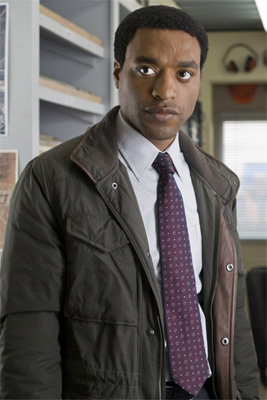
CHIWETAL HEADS BACK TO A DISASTROUS FUTURE.
EXCLUSIVE Chiwetal Ejiofor, 2012 Interview by PAUL FISCHER.British actor Chiwetal Ejiofor is making quite a name for himself on both sides of the Atlantic. Coming up in Phillip Noyce's upcoming Salt, the actor joins John Cusack in the disaster epic 2012 as a scientist working for the White House who discovers the perilous situation the earth finds itself in. He talked to Paul Fischer in this exclusive interview.
QUESTION: When you read a script like this, how big of an imagination do you need to be able to see what else is going to be part of this movie, as well as your own character?
CHIWETAL EJIOFOR: I think a bigger imagination than mine. I can't even rationalize that side of the script, when I first read it. I couldn't rationalize it at all. And I felt like I just had to leave that up to the director. You know, I couldn't get my head around it. And I only can equate it to the kind of "Cleopatra Enters Rome" idea. You know, that it's a very small line in the script, but takes 3 ½ months to shoot. And you just kind of - you've just got to read past it. And - you know, and so, "California destroyed." I mean, what is it - how do you envision it is an actor? And - you know, so you look to what the story is saying. And to what the - to what the characters are saying, and what the narrative is, and what's going on with them. What the relationships are. And - and that's where I find Roland to be fascinating. You know, that I think he is somebody who can combine these two very rich elements of cinema. He gives people an incredible cinematic experience and yet, is able to hold onto a narrative, really authoritatively and create really special characters. So I'm astounded by him, in many ways.
QUESTION: I mean, your character is the rational, levelheaded guy. And he could have been very boring to play. But you gave him, obviously, a lot of color. How much of that was in the script, and how much of that was you trying to add as much as you could to the - to what was on the page?
CHIWETAL EJIOFOR: Well, I just think it depends on how a part catches you, you know? Because I suppose you read a character, and there's no loaded gun. You know, you can say, "This isn't really my"- you know. But if you read a character, and you are taken with the character, and you feel like there's a lot to explore, then that's part of you meeting that character, in whatever context, on whatever plane that that happens. So, yeah. I wouldn't run towards a character that I thought was sort of boring, or not interesting. But I could definitely see how a scientific character can - or, a science guy - can be perceived as somebody who's not got all the kind of sort of color of other parts. But I thought one of the fascinating things about this guy was that he is somebody who is a kind of impromptu, or sort of accidental insider. And that he's somebody who's - you know, on the outside. And only because he discovers what's happening is he then brought in to the inner sanctum of the kind of Hollywood - [LAUGHTER] Hollywood. The kind of Washington elites, within the White House. And so I thought that was an interesting way of taking at audience behind the curtain, and showing somebody going from a certain naiveté to a very - to having to really impose their own stamp on what's happening. I liked that.
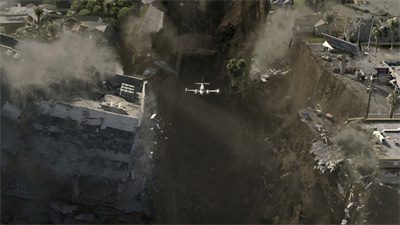 QUESTION: Now, did you feel like you needed to do any research on either the 2012 mythology, or mythologizing, I suppose, of the year 2012, or the scientific aspects of your character? Which is really, in a way, kind of dealt with very early on in the film?
QUESTION: Now, did you feel like you needed to do any research on either the 2012 mythology, or mythologizing, I suppose, of the year 2012, or the scientific aspects of your character? Which is really, in a way, kind of dealt with very early on in the film?CHIWETAL EJIOFOR: Yeah. Both. I felt like to really - I mean, I knew a little bit about 2012. I knew enough to know when I got the script and it was called 2012, and it was directed by Roland Emmerich, I knew enough to know the general landscape that the film was going to be in. And that there was an apocalypse movie, really. And so I was - you know, I knew a little bit about the Mayan calendar. But it was important to me to find out a little bit more. You know, to just sort of understand what the context of the film was. And then the same, really, with the science stuff of it. I wanted to know about it, so I had to hit the books a little bit, to just work out what I was - what I was talking about. And - you know, that way, be able to express it in a way that, even if an audience doesn't get every nuance of it, will be able to get the overall idea. You know. "This is good, this is bad," that type of thing. And so - you know, it's important to me to know about that. So, I was - you know, I had a good time with that. And as you say, it was only really for the beginning part of the film. And then the rest of the movie is really about people trying to survive, and trying to - you know, do the best they can, under pretty difficult circumstances.
QUESTION: This is probably one of the biggest films you've been involved with, I guess, on a large scale. When you're on a set like this, what goes through your mind? I mean, what are you thinking of? Or do you think about it at all? Do you work any differently, in such a massive, machine-like environment?
CHIWETAL EJIOFOR: No. I mean it's strange. I always think the same thing, when I'm working. You know. I always feel the same way. You never perceive it - you always just want to do the best work you can do. You want to - you know, you just want to give it your best shot, basically. I've never been on a film that's been a smaller budget, and thought, "Ah, not many people are going to see this, so I can just take it easy today," you know what I mean? So, I don't feel any inherent pressure because there may be more people seeing the movie, as a kind of fact of it, because it's a larger budget. I just feel like I feel whenever I do a project. That you always want to just give it your best go, and see what happens, you know? And - you know, the sets are bigger. But when the comes down to it, the camera can only catch so much. And so what you're actually contributing in any particular take is - you know, a narrow part of the whole thing. A narrow part of the whole set. Or just your face, or just an eye, you know? So, it's kind of - you know, you're still dealing with the same relationship, in terms of the camera, and in terms of the other actors, that you do on any picture.
QUESTION: You mentioned that you find that you were able to visualize, when you're reading the script, what these things are going to look like. When you're working on a movie like this, and you have to react to visual - to non-existent visual sequences, do you have the same - did you find that also equally challenging?
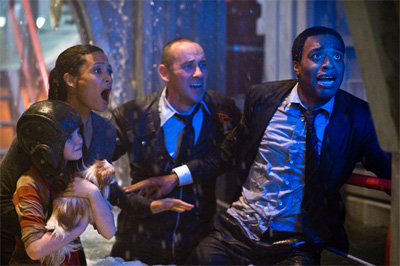 CHIWETAL EJIOFOR: Yeah. I think it is quite tough to react to things when they're not there. But - you know, I think it's - especially for cinema - you know. Which is just slightly - in theater, I think it's a tiny bit easier. And also, it's an inherent part of theater. But cinema - you know, you do get spoiled, working in films, that everything is - you know, everything is right in front of you. You know. There's not the two twigs for the forest. And then it's - you know, and it's like bigger budgets you get to in films, the more it sort of goes back to a slightly more theater-idea. But - yeah. No, you have to sort of activate that part of your imagination, that can really put your character in those situations, and try and keep them as real and as natural as possible, even though there's not the same sort of thing to react to. And then, you know, you can get - I think it's one of those things, where you can slightly get it wrong, a little bit. And then you kind of have to figure that out a little bit in post. But I think that's a great advantage, somehow, of the post-production - you know, ability of these films. Is that if you do react to something, and somehow it's wrong - you know, somehow it's too big for the small thing that's coming past you, or whatever - you know, they can make the other thing bigger. [LAUGHTER] You know, they can do a lot with it. They can sort of affect it. But, you know, Roland was incredibly good at really trying to explain, at every stage of it, exactly what we would be looking at, exactly what the environments were like, and so on. So. And also, it's a testament to his imaginative capability, that when we then saw it, not only did so much of it fit that we were reacting to, but it also was - had even more depth and scale and nuance than I had envisaged when he was explaining to me what it would look like.
CHIWETAL EJIOFOR: Yeah. I think it is quite tough to react to things when they're not there. But - you know, I think it's - especially for cinema - you know. Which is just slightly - in theater, I think it's a tiny bit easier. And also, it's an inherent part of theater. But cinema - you know, you do get spoiled, working in films, that everything is - you know, everything is right in front of you. You know. There's not the two twigs for the forest. And then it's - you know, and it's like bigger budgets you get to in films, the more it sort of goes back to a slightly more theater-idea. But - yeah. No, you have to sort of activate that part of your imagination, that can really put your character in those situations, and try and keep them as real and as natural as possible, even though there's not the same sort of thing to react to. And then, you know, you can get - I think it's one of those things, where you can slightly get it wrong, a little bit. And then you kind of have to figure that out a little bit in post. But I think that's a great advantage, somehow, of the post-production - you know, ability of these films. Is that if you do react to something, and somehow it's wrong - you know, somehow it's too big for the small thing that's coming past you, or whatever - you know, they can make the other thing bigger. [LAUGHTER] You know, they can do a lot with it. They can sort of affect it. But, you know, Roland was incredibly good at really trying to explain, at every stage of it, exactly what we would be looking at, exactly what the environments were like, and so on. So. And also, it's a testament to his imaginative capability, that when we then saw it, not only did so much of it fit that we were reacting to, but it also was - had even more depth and scale and nuance than I had envisaged when he was explaining to me what it would look like.QUESTION: Now have you seen the final film?
CHIWETAL EJIOFOR: Yeah. I thought it was incredible. I mean, absolutely amazing. And a really staggering achievement, I think, in filmmaking. And I'm really excited for audiences to take a look.
QUESTION: Now, most of your scenes are with Oliver Platt whom I've interviewed a number of times. Was there any improv at all there? Did you have a good chuckle in between?
CHIWETAL EJIOFOR: We definitely did. I mean, he's an incredibly funny guy, and we laughed all the way through, you know. And then we got - the cameras got turned, we've got fighting to do, shout at each other, or whatever. But, you know, we had a really good time. And, you know - the nature of these two characters was actually kind of - there was a fluidity to it, which Roland and Harold wanted to approach it. And they let us really figure out a lot of what we were - you know, working with. And so the four of us would get together several times and work out the scenes, and work out what we were saying to each other, and try and - you know, draw that kind of fine line balance between two very opposed, but two plausible points of view. That - there wasn't any definite kind of - I mean, my character takes the moral high ground, if you like. But there's no definite moral bias in the script. You know, both points of view could arguably be the moral point of view. So - it was kind of an interesting dynamic to run with somebody. And Oliver's a great actor, and he's a very intelligent guy, and a very smart guy, when it comes to scripts and characters and narrative and story, and the direction of a character. So, you know, it was really good to be able to play all those things off with people that I respected.
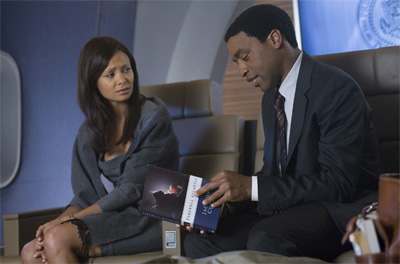 QUESTION: Your career has taken off quite dramatically over the last couple of years, on both sides of the Atlantic. How surprised are you by that?
QUESTION: Your career has taken off quite dramatically over the last couple of years, on both sides of the Atlantic. How surprised are you by that?CHIWETAL EJIOFOR: Well, you know, it's great to work, you know? I always - you know, I've always enjoyed - I've always wanted to carry on working as an actor. I've been very, very fortunate in my working career, to work with great people. And I think for any actor who's working, and any actor who's getting to do stuff that they really enjoy, and stuff they really like - but, you know, there's an element of surprise. You know. It's a profession that seems to select people quite haphazardly. And - you know, it's great to be - you know, at the moment, a person who's in the mix.
QUESTION: What are you doing next?
CHIWETAL EJIOFOR: Well, I'm finishing off doing Salt, which is the film which we shot in New York, and we're just putting the kind of finishing little bits and pieces on.
QUESTION: How is that looking?
CHIWETAL EJIOFOR: I think it's looking great. Yeah.
QUESTION: You play?
CHIWETAL EJIOFOR: Counter-intelligence officer, CIA. Peabody and it's a great cast. Angelina Jolie, and Liev Schreiber, and Phillip directing. And it was really a great experience, and a great time, and - you know, I think it's going to be a really unique and interesting movie. It's - you know, it falls into the realms of the paranoid thriller. You know, which we don't see a lot of these days. And I think it takes a really skilled director to play that. There's so many different layers to it.
QUESTION: And do you know what your next gig is?
CHIWETAL EJIOFOR: Well, there's a couple of things that I'm very excited by, that it's a little too early to talk about. But there's definitely great stuff that I'm looking forward to.
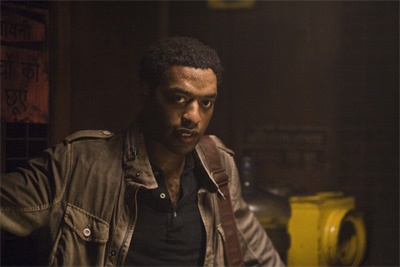 QUESTION: What about returning to the theater?
QUESTION: What about returning to the theater?CHIWETAL EJIOFOR: I want to do that. I don't know - I don't know if I'm going to do that absolutely immediately. But you never know. It's quite possible. But - you know the theater is just an intrinsic part of my working life, and I can't be far away for too long.
QUESTION: Would you want to go and do something in the States, on stage?
CHIWETAL EJIOFOR: Yeah. I mean, it just depends on what it is. I don't really mind, you know. It doesn't - you know, it doesn't bother me either way. I'd love to do theater anyway. And I would like to do theater everywhere.
QUESTION: Is there a character that you have a burning desire to play? Like, a classic character that you'd really like to play before time passes you by?
CHIWETAL EJIOFOR: No, I love doing classical theater, but I also feel like I want to do a lot of modern stuff, as well, so that's kind of what I've been looking at, you know. And - some new writing, as well.
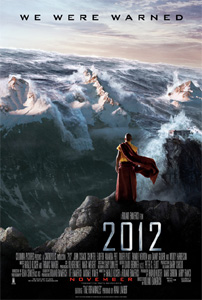
2012
Starring: John Cusack, Chjwetel Ejiofor, Amanda Peet, Oliver Platt, Thandie Newton, Danny Glover, Woody HarrelsonDirector: Roland Emmerich
Genre: Action/Adventure
Roland Emmerich has given movie watchers several apocalyptic films in the past in INDEPENDENCE DAY and THE DAY AFTER TOMORROW, and he offers another look at the end of the world in 2012. This action film stars John Cusack, Chiwetel Ejiofor, and Amanda Peet.
MORE
- Emma Stone Magic in the Moonlight
- Jessica De Gouw Cut Snake
- Maxine Peake Funny Cow
- Denzel The Equalizer 2
- Johnny Flynn Beast
- Logan Marshall Green Upgrade
- Shailene Woodley Adrift
- Eric Toledano and Olivier Nakache C'est La Vie...
- André Leon Talley The Gospel According To André...
- Shakespeare In Tokyo
- Mission: Impossible Fallout
- Glenn Close The Wife
- Allison Chhorn Stanley's Mouth Interview
- Benicio Del Toro Sicario: Day of the Soldado
- Dame Judi Dench Tea With The Dames
- Sandra Bullock Ocean's 8
- Chris Pratt Jurassic World: Fallen Kingdom
- Claudia Sangiorgi Dalimore and Michelle Grace...
- Rachel McAdams Disobedience Interview
- Sebastián Lelio and Alessandro Nivola...
- Perri Cummings Trench Interview



